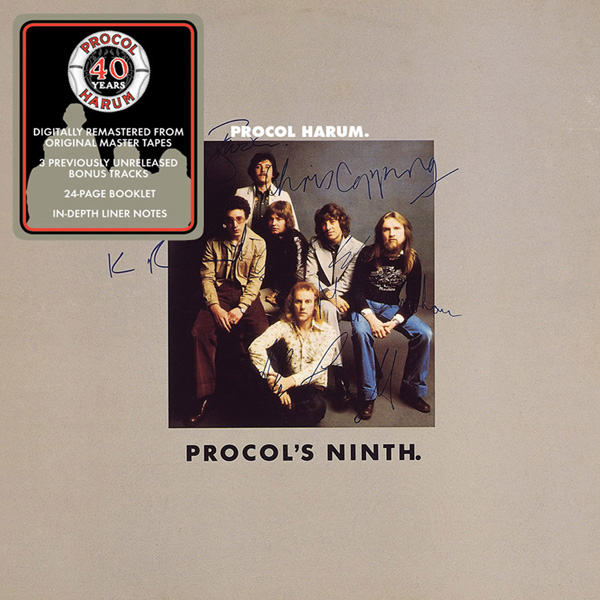
Procol Harum
Beyond |
|
|
|
|
Order from The BtP Store get it from Amazon UK

Unlike other bands that had blossomed out of late-1960s psychedelic Britain, only to fall dramatically by the wayside, Procol Harum had left the paisley shirts behind and continued to produce strong albums, clocking up number eight with the previous year’s Exotic Birds and Fruit. Even if, through all this, the spectre of the perennial A Whiter Shade of Pale conspired to deny them wholesale global success.
This, the aptly titled Procol’s Ninth, arrived with a new production team and a straightforward, no-frills album cover, signalling a change in – if not the direction that Procol Harum were taking – the sound they were producing.
Procol’s Ninth was to be first album since 1969’s A Salty Dog not to utilise the services of producer Chris Thomas. It shows as well, with the quirkiness often associated with the Procol Harum sound dismissed in favour of a more polished, straightforward style. The men responsible for this were American songsmiths Jerry Leiber and Mike Stoller, whose writing partnership had clocked up hits for Elvis, The Coasters and many more. Their production style however, seems to have come directly from the Phil Spector school of thought, as they bury some of Brooker and Reid’s songs beneath layers of instrumentation, pretty much as Spector did with Lennon and McCartney’s material on Let it Be.
In doing so, it goes a little way to robbing the band of their soul. Nevertheless, Gary Brooker’s voice ensures it remains unmistakeably Procol Harum.
Despite these reservations there’s enough here to keep this writer happy. Procol’s Ninth is, after all, the album upon which Pandora’s Box appears, a song first written in 1967 but never released; here rejuvenated in all its mythical lyricism and marimba malleated glory.
Former majesty is also flirted with on grinding, piano-driven tracks such as Fool’s Gold, Without a Doubt and on the highland-infused Piper’s Tune.
Interestingly, Procol’s Ninth is the first and last Procol Harum album to feature cover versions, two in fact, and it’s somewhat unfortunate that the original album finishes on one of these, a lacklustre version of The Beatles’ Eight Days a Week. Recorded for fun, it sounds unfinished and out of place, and was reputedly included by the producers against the band’s wishes. Not hard to see why.
But the question remains, in 1975 were Procol Harum still relevant?
On the strength of Procol’s Ninth, the answer is just about. But the crown was slipping, a fact supported by this being the penultimate album before Procol Harum took a 14-year break.
Still, presentation-wise, Salvo has once again come up trumps. The
packaging, the booklet, the attention to detail, the bonus tracks and, of
course, the sound quality are all top notch, cementing the label’s position
as one of the best when it comes to reissues.
|
|
|
|